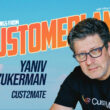In the latest edition of TheCustomer Quick-Take: Would you still be loyal if you couldn’t know your rewards?, Where to find extreme brand loyalists, 500 billion reasons to start paying attention to Gen Alpha, and How long is too long to hang on to customer data?
Editor’s note: First, thanks for all your support and input on this newsletter! We had high hopes that we were on to something good when we first published this just over a year ago and you seem to be telling us we were right. So … thanks! Second, if you’d like to get this delivered straight to your inbox each week, you can do so by signing up here. And if you’re really feeling generous, tell somebody about it. Did I mention thanks?!?
Happy Wednesday!
LOYALTY
Bonvoy Goes Dynamic
Quick-Take: The long-rumored news has finally rung true: Marriott Bonvoy will transition to dynamic award pricing. You read that right. Starting in March 2022 (the exact date remains to be announced), the hotel group will remove its award charts with set redemption rates. When this happens, hotels will be able to change their award pricing night by night. The good news is that you have until March 2022 to lock in award nights at current prices, and most (but not all) hotels are expected to only price award nights within the off-peak and peak bands of their current category through 2022.
Extreme Loyalty
Quick-Take: Almost half (49%) of Australian consumers indicate that there some brands they will never switch from no matter what, according to findings from a new Emarsys Customer Loyalty Index.
Fast Loyalty
Quick-Take: In April 2019, Reebok first launched its free tiered loyalty program, Unlocked, as a way to grow sales and build out personalization efforts through customer data. Two and a half years later, the program has grown to 10 million members, and Reebok has found that these members provide three times the sales of a non-loyalty customer.
Addressing Weaker Brand Loyalty
Quick-Take: According to InMoment, 50% of customers will leave a brand that they were formerly loyal to for a company that better meets their needs. Additionally, 55% of customers trust companies less than they used to.
Better Loyalty Through Listening
Quick-Take: Loyalty is fueled by listening — 90% of repeat customers scored a business’ ability to listen as their most important attribute. With curated content from platforms like Instagram and TikTok at their fingertips, consumers have come to expect that brands understand them and are paying attention to their likes and dislikes. Tailored experiences that show a company is listening are being rewarded with brand loyalty and advocacy.
TRENDS
You May Have Overlooked Them
Quick-Take: Since Covid’s March 2020 lows, Etsy shares are up some 600%, torching the Nasdaq (up 115%), eBay (175%), Walmart (35%) and Amazon (100%). The 16-year-old company is worth just shy of $30 billion. Active buyers and sellers on Etsy have doubled to 90 million and 5 million, respectively. As with most digital retailers, growth has slowed in the second half of 2021 as the economy has reopened, but analysts are betting Etsy will hit a 30% sales increase in 2021.
A New Pocket of Influence
Quick-Take: The oldest members of the next generation of consumers, Generation Alpha, were born in 2010, yet in just a decade they’ve learned to become smart online shoppers. In 2020, 81% of children under the age of 12 were reported to influence family purchases, translating to $500 billion in purchases a year.
Better Recall Through Scenting
Quick-Take: “Multiple studies have shown that people can remember smells with 65 per cent accuracy even after a year, while visual recall is 50 per cent in three months,” says Alireza. “It’s a very fine detail, but it’s fascinating. The fact that humans can recall scents for a long time allows brands to create a strong connection with their customers through scent.”
CX
The Definitive ROI of Good CX
Quick-Take: According to the FERS survey data, improving the customer experience (CX) directly impacts the organization’s bottom line. More than a third of respondents globally (34%), reported improved profit marginsas one of the top five benefits arising from their CX initiatives. Organizations attributed these higher profit margins to increased revenue (27%), cost reductions in personnel (25%), marketing (22%), and customer acquisition (18%).
Different Survey, Consistent Results
Quick-Take: The IDC survey results showed that 34 percent of respondents found that their customer experience initiatives resulted in improved profit margins. Of those surveyed, 27 percent attributed this to increased revenue, 25 percent to reduced personnel costs, 22 percent to marketing, and 18 percent to customer acquisition.
The CX Effect on Shareholder Return
Quick-Take: A new study reveals the significant payoff (and penalties) associated with customer experience quality in today’s marketplace. Widely loved brands with strong consumer feedback ratings enjoyed an average shareholder return that was nearly 110 points higher than the market index, while widely loathed ones lagged by an almost identical margin.
QUESTIONABLE CORPORATE BEHAVIOR
This is Really a Message for Facebook
Quick-Take: Three-quarters (74%) of the general public say they like having technology in their life but distrust big tech companies. Among enterprise IT B2B buyers, a company’s commitment to ensuring ethical use of technology makes nearly 9 in 10 (87%) more likely to purchase their products.
AT&T Behaving Badly
Quick-Take: Amid an ongoing debate over Internet users’ privacy, new documents indicate that AT&T holds onto its customers’ location and usage data for seven years – far longer than its rivals. “There is no conceivable business reason they need that much,” Nate Wessler, deputy project director of the Speech, Privacy, and Technology Project at the American Civil Liberties Union (ACLU), told Motherboard. In comparison, T-Mobile holds onto its own subscriber data – including call records, cell site connection information and text content – for around two years before discarding it. Verizon holds onto such data for one year.
Photo by Michal Janek on Unsplash.













